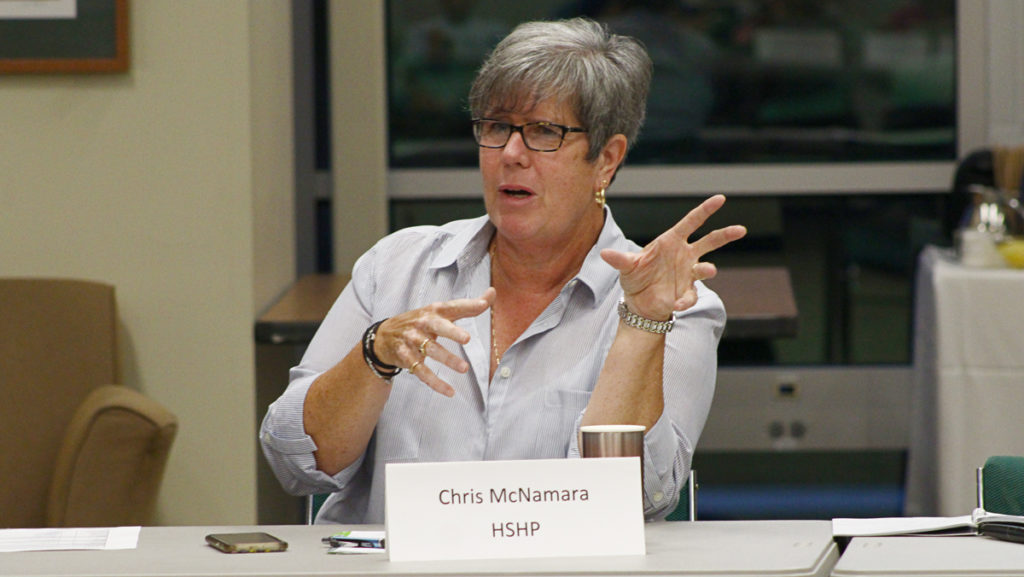The Ithaca College Faculty Council discussed adding an amendment to the Faculty Handbook to prevent faculty of color from being disproportionately affected by faculty cuts, although this amendment would not apply to the resizing that will occur within the college this academic year.
La Jerne Cornish, provost and senior vice president for academic affairs, announced during the Faculty Council meeting Oct. 6 that approximately 130 full-time equivalent faculty positions are expected to be cut due to low enrollment. The cuts are in line with the Ithaca Forever Strategic Plan, which has been accelerated because of the COVID-19 pandemic’s effects on the college’s finances. As stated in Section 4.9.8 of the Ithaca College Policy Manual, terminations resulting from the discontinuance of a program will be done in the order of part-time per-course faculty, adjunct faculty, faculty employed by term appointments, non-tenure-track faculty, tenure-eligible faculty and tenured faculty. Nationally, faculty of color are more likely to be in contingent rather than tenured positions. In Fall 2017, only 19% of fully tenured professors were nonwhite, according to the Pew Research Center.
Raul Palma, assistant professor in the Department of Writing, presented on affirmative action during retrenchment to the council. According to a document provided to the Faculty Council, the majority of the faculty of color at the college were hired within the past five years. As of Fall 2020, 13% of faculty identified as people of color, according to the Office of Analytics and Institutional Research. This percentage has increased from 11% in 2016 but decreased from 14% in Fall 2019. In Fall 2020, 191 out of 1,473 faculty were people of color. In 2019, there were 250 faculty of color out of 1,804 faculty members. The college community is predominately white, with 72.2% of students and 79% of faculty identifying as white.
“As a [Faculty Council], we believe it’s important in retrenchment that Ithaca College does not undo the progress it has made in hiring faculty of color,” Palma said.
The council discussed the idea of pursuing an amendment to the Faculty Handbook that would help the college maintain racial and ethnic diversity among faculty during retrenchment. According to the Faculty Handbook, proposals for amendments must be approved by the Faculty Handbook Amendment Committee, which involves review by Cornish and the Office of the General Counsel. The amendment then needs approval by the Faculty Council, which may make changes to the amendment. The final amendment then needs to be approved again by Cornish as well as the Ithaca College Board of Trustees before it can be implemented.
Chris McNamara, clinical associate professor and clinical director in the Department of Physical Therapy and chair of the Faculty Council, explained that this process can take years and would not help faculty of color during the current retrenchment process. In October, the Faculty Council Executive Committee (FCEC) requested that the Senior Leadership Team (SLT) slow the Academic Program Prioritization (APP) process, but the request was denied. The Academic Program Prioritization Implementation Committee and the Academic Program Prioritization Advisory Committee will recommend the departments and programs to be discontinued, consolidated, reorganized or grown by Dec. 31. President Shirley M. Collado and Cornish will make the final decisions by the end of February 2021.
Aaron Witek, assistant professor in the Department of Performance Studies, asked the council to develop a clear definition of diversity.
“I think it’s really important if we’re going to do anything to the handbook that we’re looking into the future beyond this as well,” Witek said. “What is actual diversity, our definition on this campus? Because it seems like it’s [Asian, Latino, African and Native American] faculty, but diversity is a lot more, and that’s one of my concerns. We’re not looking at diversity and how it’s going to progress possibly in the future. We’re not looking at sexual orientation and things like that, and that’s diversity.”
Several council members suggested that the discussion of an amendment be put on hold to avoid placing more stress on faculty. McNamara said she believes it is beneficial to discuss the issue of maintaining diversity during the APP process because it would show the SLT that the issue is important to the council.
“I think there’s value in having the conversation now because it signals intention to the Senior Leadership Team, even though I know there’s nothing that can be done by Dec. 31 because of handbook restrictions,” McNamara said. “It signals intention and commitment to our BIPOC faculty.”
Some council members like Phil Blackman, assistant professor in the Department of Accounting and Business Law, brought up legal concerns about maintaining the value of tenure while protecting faculty of color.
“The Faculty Handbook is a contract, and since the APP process has begun, the tenure faculty have relied on the procedures that are in place,” Blackman said. “So to come in anytime before those decisions are made, you’d likely subject us to some serious legal scrutiny if a tenured faculty member who relied on that contract was somehow changed late in the game and didn’t have a chance to represent his or her or their interest.”
The council also addressed the proposition to hold a town hall about faculty cuts, an idea that was brought up at the Nov. 10 Faculty Council meeting. An all-faculty meeting scheduled for Dec. 10 will be a town hall, McNamara said. Cornish, Collado and the SLT will be present at the town hall to answer questions.
Dave Gondek, associate professor in the Department of Biology, discussed the Integrative Core Curriculum (ICC) Task Force’s proposed changes to the ICC. The new ICC system would not use the e-portfolio format, which will save approximately $220,000 because the college will no longer need to pay for the software platform, Gondek said.
Incoming freshmen in Fall 2022 will be the first class to use the new ICC system. It was originally planned to be implemented in Fall 2021 but has been delayed due to the COVID-19 pandemic, Gondek said.








